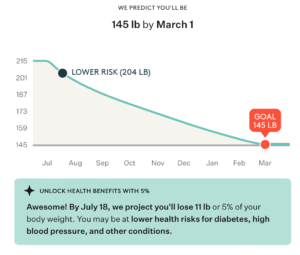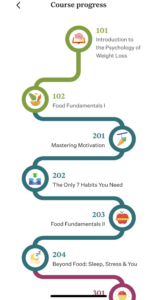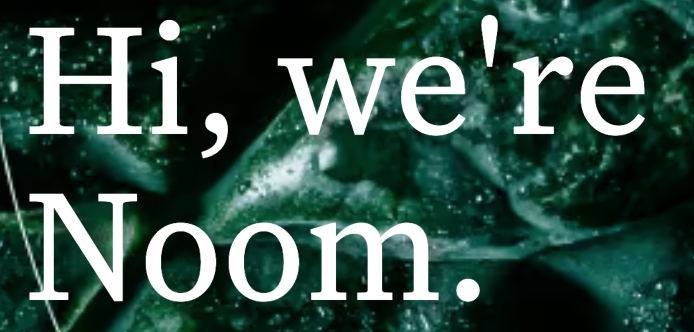Now that I have a much better idea of what it takes for me to lose weight (complete avoidance of sugar, sweets and sweeteners, plus drastically reduced bready, pasta-y carbs), I’m curious about Noom. I’ve seen ads for Noom on my streaming services (and maybe YouTube) and it promises weight loss for everyone, no matter how many times you’ve failed before. There’s a pretty comprehensive description of how much it costs and what you get here, but when I went to the main website to find out what it was, I got dropped into a quiz that started with the question “What is your weight loss goal?” It then led me through an exploration of what my health and general life look like now and ended with a 7-day free trial offer.
After I drastically changed how I eat, I lost 10 pounds in six weeks, so I’m already on my way. But I’m still curious about Noom, so after entering a goal weight of 145 lbs and my current weight (214 lbs) and

answering a bunch of other questions, I signed up for the free trial. At the end of the questionnaire, Noom told me I can reach my goal by March 1, 2024 if I use their program (after I started logging food in the app, this changed to Feb 29, one day earlier).
The Noom app declares the program to be a customized course “rooted in science and psychology,” and mentions cognitive behavioral therapy as a method for changing my eating habits. Apparently the focus isn’t on restricted dieting, but on changing my attitude towards food which will lead to healthier food choices.
In fact, the first thing I got on the app welcome screen was a multiple choice question: In your opinion, at this very moment, what do you think is the best way to reach your weight-loss goals with Noom?
The choices were: A. Exclusively eat salads, B. Exercise for 30 minutes a day, C. Take lots of supplements, D. Simply believe.
The answer is Simply believe. They use the logic that whether you think you can or you can’t, you’ll be right. This sets up a convenient way for Noom to avoid accountability and any lawsuit I might bring if I don’t lose weight. If it all comes down to me believing I can do it, I have no one to blame but myself.
They say they’re psychologists (“…we’re psychologists.”) and that this will make the difference. They say how and why I eat are more important that what I eat. I won’t have to eliminate any foods or eat anything I don’t want. Exercise is optional but encouraged. Sleep, stress and healthy relationships are just as important as food and exercise. But apparently the core of the program is using psychology to help me learn and change.
That sounds good and so does what I’ll get if I buy the program and do the whole thing: sustainable healthy eating, exercise, sleeping and self-care habits, coping skills for stress, a better relationship with my body, mindfulness in all areas of life, lasting motivation (wow!), more confidence, better communication, and “the benefits will keep on coming.”
How does Noom do this? It’s 10 mini-courses each accompanied by a quiz. I choose the pace by committing between 1 and 12

minutes a day to the program. No, it doesn’t mean that in 12 minutes a day I can complete all the exercising and other tasks. It means that’s how many minutes I’ll spend with the app, listening to or reading the material.
The psychology part starts by asking about my Super Goal. I filled it in this way:
Your Super Goal is to: Attract dates again
The app answered me Nice! and then asked So, why do you want to achieve this goal?
I put To not die alone.
The next screen said Let’s dig a little deeper for your Ultimate Why. You told us you want to achieve your Super Goal because you want to: To not die alone. Why?
I didn’t know what they were going for here and felt at a loss, so I put I like people. I was grateful that the app let me leave it at that.
Now I get to a part I’m not totally comfortable with. I’ve been hearing for years about how important it is to not weigh yourself too often. Weight fluctuates a lot and we can get very emotional about this, so to avoid discouragement, it seems once a week is the most frequently one should weigh oneself. But Noom disagrees! Part of the program is weighing myself every morning.
The app admits that weight fluctuates all the time, including from hydration, salt intake, etc. But it thinks that because weight fluctuates by a few pounds every day, it’s important to weigh yourself every day. Wha-a-a?
That seemed questionable enough, but the app also told me “Gaining 1 pound requires consuming 3,500 extra calories.” Warning buzzer! I know from my research (including Dr. Robert Lustig’s writing) that focusing on calories is absolutely the wrong way to go for weight loss and for health in general. At this point, Noom looked even more like it was not for me (my serious doubt began with that “Believe” stuff).
The next screen on the app told me that research shows that weighing yourself every day builds self awareness, helps you make healthier choices, and results in more weight loss over the long term. Fortunately, Noom lets you decide how often you’ll weigh and even offers a link to a $99 smart scale that links to the Noom app (how convenient). It lets you report your daily weight without even knowing what it is.
The first mini-course was supposed to teach me about the psychology of health and weight loss, but all it did was tell me what to eat and drink. What stood out to me was that the diet advice was all about calories. So apparently this program doesn’t make you give up all the fun foods, but it certainly hopes you do it on your own.
Some of it sounds all right because it encourages eating vegetables and fruit in their whole, natural state (fiber – yes!). But the focus on calories leads Noom to suggest things like: Spread whole grain toast with two teaspoons of unsweetened jam instead of peanut butter. That substitutes a fat-free, sugary spread for a fatty, less sugary one. Since I know fat calories are less harmful than sugar calories, this advice is terrible.
The material talks about avoiding calorie dense foods (“CD” foods). The fixation on low-fat, fat-free and calories is straight from 1985. It’s outdated and harmful.
So each day I’m supposed to weigh myself, log all food eaten, and hit a water goal (glasses of water drunk). So far Noom doesn’t like what I had for breakfast today. It liked the blueberries (which it calls a “green food”), but it calls my scrambled eggs a “yellow food” which means it “has more calories and/or less nutrients than green foods.” An egg has fewer nutrients than blueberries? This is science?
Other “yellow foods” are starches and lean meats. Lean meats? Noom wants me to take it easy on the lean meats? What planet is this science from?
Noom dislikes even more my cup of full fat yogurt and handful of raw almonds. It calls those “orange foods” which means they’re “the most calorie-dense and/or have the least healthy nutrients and should be eaten less frequently and in smaller portions. Some common orange foods are red meats and dessert dishes. Try to limit these foods and be mindful of your portion size when you do eat them.”
Noom puts raw almonds in the same category as red meats and desserts. What the hell?
Lunch: my two corn tortillas and 4 tablespoons of salsa were good (“green”), but the guacamole counts as a “yellow food” and the cheese I put in the quesadillas was another “orange food” (I guess they didn’t use red because would be too inflammatory). This meal sent my food soaring over the calorie limit.
Wait – calorie limit? Am I supposed be eating within a certain number of calories? How do I know what that limit is?
Oh, yeah, I have Noom guides. I just sent a message. There might even be a real person on the other end of this chat support because no chirpy message came back a nanosecond after I sent my question.
As I look at the full “analysis” of what I’ve eaten so far today, I see:
GREEN: blueberries, corn tortillas, salsa
YELLOW: fried eggs, guacamole
ORANGE: full-fat yogurt, raw almonds, cheese
Uh, I see a pattern of Noom not liking fat, and that’s going to be a problem for us.
I’ll blog more about this. This is just Day 1 of a 7-day free trial, but you know I’m canceling before they charge me $212.55 for 9 months of this.
More on this topc: Noom Obsesses Over Calories
30 June 2023

That segmenting of foods seems very weird and old school (not in a good way).
It’s hard to believe Noom hasn’t heard that calorie-counting is out, but calorie-counting has been extremely profitable for the diet industry, so maybe I can’t blame them for riding that trend. Actually, I can.
Yes, I’ve never done Noom, but from knowing people who’ve done it, it does seem, at its core,to be just another calorie counting app with the window dressing of psychology, etc.
Yes, I’ve never done Noom, but from knowing people who’ve done it, it does seem to, at its core, just be another calorie counting app with this window dressing of psychology, etc.
Did the people you know who have used it lose weight? Did they like it?
I do know some people who have liked it and lost weight with it. I also know people who lost some weight, but felt hungry all the time so couldn’t keep doing it.
Yeah. It’s the same old stuff. Do you mind if I quote you in another post?